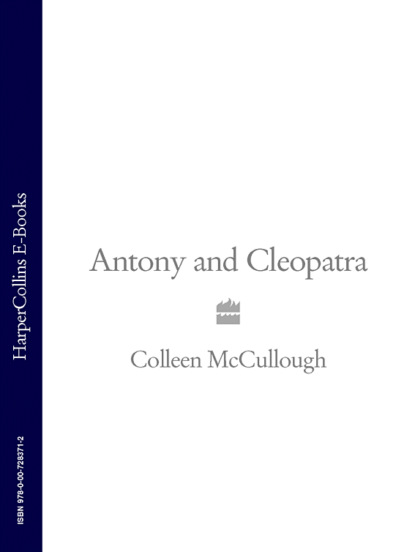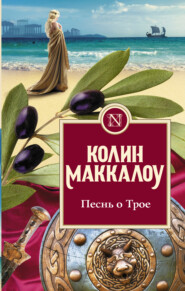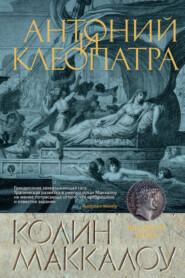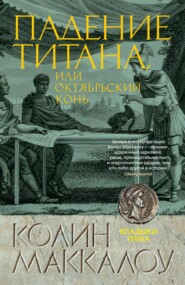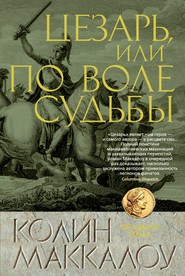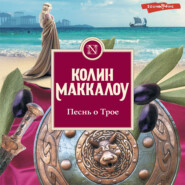По всем вопросам обращайтесь на: info@litportal.ru
(©) 2003-2024.
✖
Antony and Cleopatra
Автор
Год написания книги
2019
Настройки чтения
Размер шрифта
Высота строк
Поля
Caesarion waded in as far as his waist and then tipped himself forward to swim, moving fearlessly into deep water. He dived, came up with face a curious mixture of black and rusty red; then under again, up again.
‘The paint’s soluble in water, even salt,’ the boy said, hip-deep now, scrubbing at his face with both hands.
And there stood Caesar. No one could dispute the identity of the father after seeing the child. Is that why Antonius wants to present him to the Senate and petition it to confirm him King of Egypt? Let anyone in Rome who knew Caesar see this boy, and he’ll gather clients faster than a ship’s hull does barnacles. Marcus Antonius wants to unsettle Octavian, who can only ape Caesar with thick-soled boots and practiced Caesarean gestures. Caesarion is the real thing, Octavian a parody. Oh, clever Marcus Antonius! Bring Octavian down by showing Rome Caesar. The veteran soldiers will melt like ice in the sun, and they have so much power.
Cleopatra, cleansed of her regal make-up by the more orthodox method of a bowl of warm water, burst out laughing. ‘Apollodorus, this is marvelous!’ she cried, handing the papers she had read to Sosigenes. ‘Where did you get these?’ she asked while Sosigenes pored his way through them, chuckling.
‘His scribe is fonder of money than statues, Daughter of Amun-Ra. The scribe made an extra copy and sold it to me.’
‘Did Dellius act on instructions, I wonder? Or is this merely a way of demonstrating to his master that he’s worth his salt?’
‘The latter, Your Majesty,’ said Sosigenes, wiping his eyes. ‘It’s so silly! The statue of Serapis, painted by Nicias? He was dead long before Bryaxis first poured bronze into a mold. And he missed the Praxiteles Apollo in the gymnasium – “a sculpture of no great artistic worth,” he called it! Oh, Quintus Dellius, you are a fool!’
‘Let us not underestimate the man just because he doesn’t know a Phidias from a Neapolitan plaster copy,’ Cleopatra said. ‘What his list tells me is that Antonius is desperate for money. Money that I, for one, do not intend to give him.’
Cha’em pattered in, accompanied by his wife.
‘Tach’a, at last! What does the bowl say about Antonius?’
The smoothly beautiful face remained impassive; Tach’a was a priestess of Ptah, trained almost from birth not to betray her emotions. ‘The lotus petals formed a pattern I have never seen, Daughter of Ra. No matter how many times I cast them on the water, the pattern always stayed the same. Yes, Isis approves of Marcus Antonius as the sire of your children, but it will not be easy, and it will not happen in Tarsus. In Egypt, only in Egypt. His seed is spread too thinly, he must be fed on the juices and fruits that strengthen a man’s seed.’
‘If the pattern is so unique, Tach’a my mother, how can you be sure that is what the petals are saying?’
‘Because I went to the holy archives, Pharaoh. My readings are only the last in three thousand years.’
‘Ought I refuse to go to Tarsus?’ Cleopatra asked Cha’em.
‘No, Pharaoh. My own visions say that Tarsus is necessary. Antonius is not the God out of the West, but he has some of the same blood. Enough for our purposes, which are not to raise up a rival for Caesarion! What he needs are a sister to marry and some brothers who will be loyal subordinates.’
Caesarion walked in, trailing water. ‘Mama, I’ve just talked to Quintus Dellius,’ he said, flopping on a couch while a clucking Charmian hurried off to find towels.
‘Did you, now? Where was that?’ Cleopatra asked, smiling.
The wide eyes, greener than Caesar’s and lacking that piercing quality, creased up in amusement. ‘When I went for a swim. He was paddling. Can you imagine it? Paddling! He told me he couldn’t swim, and that confession told me that he was never a contubernalis in any army that mattered. He’s a couch soldier.’
‘Did you have an interesting conversation, my son?’
‘I led him astray, if that’s what you mean. He suspected that someone warned us he was coming but, by the time I left him, he was sure we’d been taken by surprise. It was the news that we’re sailing to Tarsus made him suspect. So I let it slip that late April is the time of year when we pull all the ships out of their sheds, go over them for leaks, and exercise them and their crews. What a fortunate chance! I said. Ready to go instead of struggling for ages to mend leaky ships.’
And he is not yet six years old, thought Sosigenes. This child has been blessed by all of Egypt’s gods.
‘I don’t like that “we”,’ said the mother, frowning.
The bright, eager face fell. ‘Mama! You can’t mean it! I am to go with you – I must go with you!’
‘Someone has to rule in my absence, Caesarion.’
‘Not I! I am too young!’
‘Old enough, and that’s enough. No Tarsus for you.’
A verdict that ruptured the essential vulnerability of a five-year-old; an inconsolable sorrow welled up in Caesarion – that pain only a child can feel at being deprived of some new and passionately wanted experience. He burst into noisy tears, but when his mother went to comfort him, he shoved her away so fiercely that she staggered. He ran from the room.
‘He’ll get over it,’ Cleopatra said comfortably. ‘My, isn’t he strong?’
Will he get over it? wondered Tach’a, who saw a different Caesarion – driven, split, achingly lonely. He’s Caesar, not Cleopatra, and she doesn’t understand him. It wasn’t the chance to strut like a child king that made him hunger to go to Tarsus, it was the chance to see new places, ease his restlessness at this small world he inhabits.
* * *
Two days later the royal fleet was assembled in the Great Harbor, with Philopator’s gigantic vessel tied up at the wharf in the little annex called the Royal Harbor.
‘Ye gods!’ said Dellius, gaping at it. ‘Is everything in Egypt larger than in the rest of the world?’
‘We like to think so,’ said Caesarion who, for reasons known only to himself, had developed a habit of following Dellius around.
‘It’s a barge! It will wallow and sink!’
‘It’s a ship, not a barge,’ said Caesarion. ‘Ships have keels, barges do not,’ he went on like a schoolmaster, ‘and the keel of Philopator was carved from one enormous cedar hewn in the Libanus – we owned Syria then. Philopator was properly built, with a kelson, and bilges, and a flat-bottomed hull. It has loads of room below deck, and see? Both banks of oars are in outriggers. It’s not topheavy, even from the weight of the outriggers. The mast is a hundred feet tall, and Captain Agathocles has decided to keep the lateen sail on board in case the wind’s really good. See the figurehead? That’s Philopator himself, going before us.’
‘You know a lot,’ said Dellius, who didn’t understand much about ships, even after this lesson.
‘Our fleets sail to India and Taprobane. Mama has promised me that, when I’m older, she’ll take me to the Sinus Arabicus to see them set out. How I’d love to go with them!’ Suddenly the boy stiffened and prepared for flight. ‘There’s my nursemaid! It’s absolutely disgusting to have a nursemaid!’ And off he ran, determined to elude the poor creature, no match for her charge.
Not long after, a servant came for Quintus Dellius; time to board his ship, which was not the Philopator. He didn’t know whether to be glad or sorry; the Queen’s vessel would undoubtedly lag far behind the rest, even if its accommodations were luxurious.
Though Dellius didn’t know, Cleopatra’s shipwrights had made changes to her vessel, which had survived its seagoing trials surprisingly well. It measured 350 feet from stem to stern, and 40 feet in the beam. Shifting both banks of rowers into outriggers had increased the space below deck, but Pharaoh couldn’t be housed near laboring men, so below deck was given over to the hundred and fifty people who sailed in Philopator, most of them almost demented with terror at the very thought of riding on the sea.
The old stern reception room was turned into Pharaoh’s domain, large enough for a spacious bedroom, another for Charmian and Iras, and a dining room that held twenty-one couches. The arcade of lotus-capital columns remained in place, ending forward of the mast in a raised dais, roofed with faïence tiles and supported by a new column at each corner. Forward of that was a reception room, now somewhat smaller than of yore in order that Sosigenes and Cha’em might have rooms of their own. And forward of that again, cunningly hidden in the bows, was an open cooking area. On river cruises most of the food preparation was done on shore; fire was always a risk on a wooden ship. But out to sea, no shore to cook on.
Cleopatra had brought along Charmian and Iras, two fair-haired women of impeccably Macedonian ancestry who had been her companions since babyhood. Theirs had been the job of selecting thirty young girls to travel with Pharaoh to Tarsus; they had to be beautiful in the face and voluptuous in the body, but none could be a whore. The pay was ten gold drachmae, a small fortune, but it wasn’t the pay that reconciled them to the unknown, it was the clothes they were given to wear in Tarsus – flimsy gold and silver tissues, brocades glittering with metal threads, transparent linens in all the hues of the rainbow, wools so fine that they clung to the limbs as if wet. A dozen exquisitely lovely little boys had been purchased from the slave markets in Pelusium, and fifteen very tall barbarian men with fine physiques. Every male on show was outfitted in kilts embroidered to resemble peacock tails; the peacock, Cleopatra had decided, was to be the Philopator theme, and enough gold had been spent on buying peacock feathers to make an Antony weep.
On the first day of May the fleet sailed, and under sail, with Philopator scornfully showing the rest its stern cowl. The only wind that would have opposed their northerly heading, the Etesian, did not blow at this time of year. A brisk southeast breeze swelled the fleet’s sails and made life much easier for the oarsmen. No tempest occurred to force them into harbor along the way, and the pilot, aboard Philopator in the lead, recognized every headland on the Syrian coast without hesitation. At Cape Heracleia, which faced the tip of Cyprus’s tail, he came to see Cleopatra.
‘Your Majesty, we have two choices,’ he said, on his knees.
‘They are, Palamedes?’
‘To continue to hug the Syrian coast as far as the Rhosicum promontory, then cross the top of Sinus Issicus to the mouths of Cilicia Pedia’s great rivers. That will mean sand bars and shoals – slow going.’
‘And the alternative?’
‘To strike into open water here and sail almost due northwest – possible with this wind – until we fetch up on the coast of Cilicia somewhere near the mouth of River Cydnus.’
‘What is the difference in time at sea, Palamedes?’
‘That is hard to say, Your Majesty, but perhaps as many as ten days. Cilicia Pedia’s rivers will be flooding, an additional handicap if we hug the coast. But you must understand that the second choice is hazardous. A storm or a change in wind direction could send us anywhere from Libya to Greece.’
‘We will take the risk and voyage upon the open sea.’





